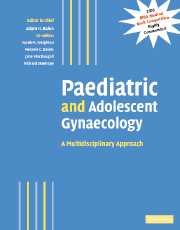Book contents
- Frontmatter
- Contents
- Contributors
- Preface
- Part I Normal development
- Part II Management of developmental abnormalities of the genital tract
- 9 Management of ambiguous genitalia at birth
- 10 Imaging of the female pelvis in the evaluation of developmental anomalies
- 11 Surgical correction of vaginal and other anomalies
- 12 Laparoscopic techniques
- 13 A nonsurgical approach to the treatment of vaginal agenesis
- 14 Psychological care in disorders of sexual differentiation and determination
- 15 The needs of the adolescent patient and her parents in the clinic
- 16 Communicating a diagnosis
- 17 Patients and parents in decision making and management
- Part III Management of specific disorders
- Index
- Plate section
- References
16 - Communicating a diagnosis
from Part II - Management of developmental abnormalities of the genital tract
Published online by Cambridge University Press: 04 May 2010
- Frontmatter
- Contents
- Contributors
- Preface
- Part I Normal development
- Part II Management of developmental abnormalities of the genital tract
- 9 Management of ambiguous genitalia at birth
- 10 Imaging of the female pelvis in the evaluation of developmental anomalies
- 11 Surgical correction of vaginal and other anomalies
- 12 Laparoscopic techniques
- 13 A nonsurgical approach to the treatment of vaginal agenesis
- 14 Psychological care in disorders of sexual differentiation and determination
- 15 The needs of the adolescent patient and her parents in the clinic
- 16 Communicating a diagnosis
- 17 Patients and parents in decision making and management
- Part III Management of specific disorders
- Index
- Plate section
- References
Summary
The right to know one's diagnosis
As physicians we set great store by diagnosis. We feel that making the diagnosis is possibly the most important aspect of the consultation or medical interaction. And we feel that patients need a diagnosis, not only to ensure that they can be treated but also that the possession of a diagnosis somehow empowers them to face the medical establishment. As if, armed with their diagnosis, the patient can be viewed as an ally of the doctor, with the condition a common enemy that they can fight together. But it is not always so. Some diagnoses are bleak, incurable and unmanageable, and some do not reflect pathology at all, but just an alternative way of being. The timing of the diagnosis and even the way in which it is made, and by whom, can be as important as the diagnosis itself.
Giving a diagnosis
The following story from my early days as a gynaecology SHO may help to illustrate the importance of timing and how a diagnosis is given.
Baby Jane's mum
I met the mother of Baby Jane during my elective as a neonatal SHO on the Special Care Baby Unit. She was 39, had been pregnant before and had three teenage boys. She was surprised, but not distressed, to be pregnant again and if this pregnancy seemed “different” from the others she assumed that it was because she was so much older.
- Type
- Chapter
- Information
- Paediatric and Adolescent GynaecologyA Multidisciplinary Approach, pp. 193 - 204Publisher: Cambridge University PressPrint publication year: 2004



